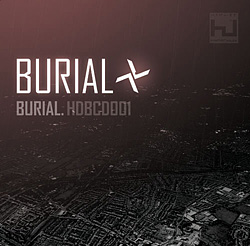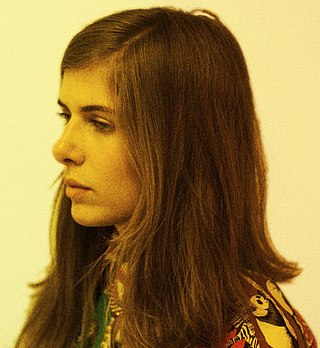Grime is a genre of electronic dance music (EDM) that emerged in London in the early 2000s. It developed out of the earlier UK dance style UK garage, and draws influences from jungle, dancehall, and hip hop. The style is typified by rapid, syncopated breakbeats, generally around 140 beats per minute, and often features an aggressive or jagged electronic sound. Emceeing is a significant element of the style, and lyrics often revolve around gritty depictions of urban life.

Hyperdub is a British, London-based electronic music record label and former webzine, founded by Steve Goodman, a.k.a. Kode9. The label was formed in 2004, and grew out of the UK's early dubstep scene. Artists signed to the label have included Burial, Cooly G, Dean Blunt, DJ Rashad, DVA, Fatima Al Qadiri, Ikonika, Jessy Lanza, Klein, Laurel Halo and Zomby.

Kevin Richard Martin, often known under his recording alias The Bug, is an English musician and music producer. Martin moved from Weymouth to London around 1990 and is now currently based in mainland Europe. He has been active for over three decades in the genres of dub, jazzcore, industrial hip hop, dancehall, and dubstep.

William Emmanuel Bevan, known by his recording alias Burial, is a British electronic musician from South London. Initially remaining anonymous, Burial became the first artist signed to Kode9's electronic label Hyperdub in 2005. He won acclaim the following year for his self-titled debut album, an influential release in the UK's dubstep scene which showcased a dark, emotive take on UK rave music styles such as UK garage and 2-step; it was named the album of the year by The Wire. Burial's second album, Untrue, was released to further critical acclaim in 2007.

Burial is the debut studio album by British electronic musician Burial, released on 15 May 2006 by Kode9's Hyperdub label. Considered a landmark of the mid-2000s dubstep scene, the album's sound features a dark, emotive take on the UK rave music that preoccupied Burial in his youth, including UK garage and 2-step. Critics have variously interpreted the release as an elegy for the dissipated rave movement and a sullen audio portrait of London.

Steve Goodman, known as Kode9 is a Scottish electronic music artist, DJ, and founder of the Hyperdub record label. He was one of the founding members of the early dubstep scene with his late collaborator The Spaceape. He has released four full-length albums: 2006's Memories of the Future and 2011's Black Sun, Nothing (2015), Escapology and Astro-Darien (2022).
Factory Girl is a traditional song. It was collected by Roud in both England and Ireland, and has been performed by The Roches, The Chieftains with Sinéad O'Connor, Lisa O'Neill with Radie Peat, Margaret Barry, Rhiannon Giddens, and Eric Burdon. In 2015, Rhiannon Giddens released a version on an EP of the same name, rewritten in response to disasters such as the 2013 Dhaka garment factory collapse.

Laurel Anne Chartow, known professionally as Laurel Halo, is an American electronic musician currently based in Los Angeles, California. She released her debut album Quarantine on Hyperdub in 2012 to critical acclaim; it was named album of the year by The Wire.

Double Cup is the first studio album by footwork musician DJ Rashad, and the sole full-length released during his lifetime. It was released on October 22, 2013 via Hyperdub. It has received critical acclaim as a pivotal album in the footwork genre.

Scratcha DVA also known as DJ Scratcha, DVA [Hi; Emotions], Scratchclart and DVA is a British electronic musician, producer and DJ often associated with DVA Music, Hyperdub and Rinse FM. His debut album, Pretty Ugly (2012) and second album, Notu Uronlineu (2016) were both released on Hyperdub.
Fatima Al Qadiri is a Senegalese-born Kuwaiti musician and conceptual artist.

Ultra is the fourth studio album by British electronic musician Zomby. It was released via Hyperdub on 2 September 2016. It features contributions from Banshee, Burial, Darkstar, and Rezzett.

Dust is the third album by Berlin-based American electronic music artist Laurel Halo. It was released on June 23, 2017 by Hyperdub. The album features contributions from Eli Keszler, Julia Holter, Michael Salu, and Max D among others, and was preceded by the single "Jelly", featuring Klein and Lafawndah.

Desert Strike is the third extended play of Kuwait musician Fatima Al Qadiri. The record is based on Desert Strike: Return to the Gulf (1992), a video game that in turn is based on events of Operation Desert Storm of the Gulf War. As a kid who lived in Kuwait during the Gulf War, Qadiri played the game a year after it took place, which messed with how she remembered experiencing the actual war. Given how dark the game portrayed the Gulf War, she intended the extended play to represent a positive and "innocent" view of it by pairing a palette of childlike sounds with war sound effects. Released on 23 October 2012 by the label Fade To Mind, Desert Strike garnered generally favorable reviews from professional music journalists and landed on Spin magazine's list of the "Best Dance Albums of 2012."

Warn-U is the debut extended play of Kuwait musician Fatima Al Qadiri, released in September 2011 by the label Tri Angle. It was a part of her project Ayshay, which intended to reinterpret Islamic worship music. The EP only consists of Qadiri's falsetto vocals that are processed and altered to create other types of electronic sounds. The EP consists of three original tracks and a "megamix" of all of them by production duo Nguzunguzu.

Genre-Specific Xperience is a project by Kuwait musician Fatima Al Qadiri that serves as her second extended play in her discography. Its intention is to reinterpret five musical genres through audio and visuals: juke, hip hop, dubstep, electronic tropicalia, and what the press release labeled as "‘90s Gregorian trance." The main idea of the project regards what would happen if the "limitations" of a genre were bypassed or altered. The visuals for the tracks were produced by Tabor Robak, Sophia Al-Maria, Ryan Trecartin, Rhett LaRue, Kamau Patton, and production company Thunder Horse. The music videos premiered at New Museum on 21 October 2011, and the extended play itself was released by UNO Records on 25 October to favorable reviews from professional music journalists. A remix record titled GSX Remixes was released in May 2012 and features re-edits of tracks from Genre-Specific Xperience by acts such as Ikonika and DJ Rashad.

Asiatisch is the debut full-length studio album of Kuwaiti musician Fatima Al Qadiri, released by the label Hyperdub on 5 May 2014. The record is about what Qadiri called "Imagined China," an environment of stereotypes about East Asian nations and respective cultures formed in media of the Western world. Thus, it musically derives from sinogrime, a style of grime music that utilizes elements of East Asian music. In representing Asian stereotypes, the album includes digital traditional Chinese and Japanese-styled drum kits and synth presets alongside "scrambled" ancient Chinese poems. One of the main inspirations for Qadiri producing Asiatisch was the making of a "nonsense Mandarin" a cappella version of the song "Nothing Compares 2 U" that would later be the record's opening track.
Klein is a singer-songwriter and producer from South London, England. She released the EP Tommy on UK label Hyperdub in 2017 and has received praise for her albums Lifetime (2019) and Frozen (2020).

Shaneera is an extended play by Kuwait musician Fatima Al Qadiri, released on 13 October 2017 via the label Hyperdub. Marking Qadiri's move towards more dance-orientated material, Shaneera is conceptually about an "evil queen" that defies "binary status quo gender roles," a character that Qadiri appears as on the EP's cover art. Many critics found Shaneera much better than Qadiri's previous records for its playful use of its concept.

Future Brown is the self-titled debut studio album by American electronic music supergroup Future Brown, consisting of Fatima Al Qadiri, J-Cush, and members of the duo Nguzunguzu. Future Brown is an electronica album fusing together genres from a variety of different cultures and backgrounds. It features several rappers and musicians also associated with from a diverse set of music scenes such as Kelela, Tink, Riko Dan, Maluca, Shawnna, 3D Na'Tee, Tim Vocals, and Ruff Sqwad members Dirty Danger, Prince Rapid, and Roachee.



















